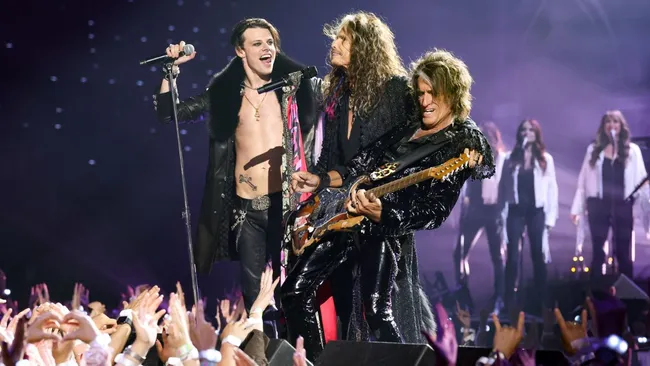
The VMAs are rarely short on spectacle, but this year’s Ozzy Osbourne tribute became something else entirely: a generational lightning rod. When Yungblud took the stage alongside Nuno Bettencourt (Extreme), Joe Perry (Aerosmith), and Steven Tyler, it should’ve been a love letter to one of heavy rock’s true outlaws. Instead, it became a battlefield.

The young British rocker’s swagger, theatrics, and genre-bending approach setting off a storm of online debate and criticism from some of rock’s old guard. And Yungblud, true to form, didn’t bite his tongue.
The Flashpoint
The performance, a gritty, high-octane medley of “Crazy Train” and “Bark at the Moon”, saw Yungblud stomping across the stage in patent-leather boots and mascara tears, his voice cutting through layers of guitar firepower from Bettencourt and Perry.
For millions watching, it was pure chaos, and pure energy. For others, it was blasphemy.
Among the loudest critics were Justin and Dan Hawkins of The Darkness, who blasted the performance as “cynical, nauseating, and more importantly, s***.” Justin added that it felt like “Jim Morrison meets the bloke from Stone Temple Pilots meets everybody else who’s ever owned a pair of leather trousers.”

The message was clear: in their eyes, Yungblud wasn’t honoring Ozzy, he was posturing.
Yungblud Responds: “You Don’t Have To Get It, It Wasn’t For You.”
In the days following, Yungblud sat down on Jack Osbourne’s Trying Not to Die podcast to set the record straight. What came out wasn’t a meltdown, it was measured, passionate, and defiantly self-aware.
“It’s hard to understand someone who is trying to do rock music in a new way,” he said. “Because, of course, I’m referencing the past. We all are. But that’s what rock and roll is, it’s about taking what you love and turning it into who you are now.”
He didn’t name names, but his meaning was clear: this wasn’t about him chasing clout or hijacking a legend’s moment. It was about paying homage, and doing it his way.
“Ozzy gave me something,” he said. “That spirit. That danger. That permission to be weird. This was my way of giving something back.”
He dismissed the backlash as “bitter” and “jealous,” suggesting that some older musicians are more invested in maintaining their own mythos than in seeing the genre grow.
“They’re intellectualizing a spirit. Rock and roll isn’t academic. It’s supposed to make you feel something. That’s what we did up there, we felt it.”
Generations Collide
At the heart of the controversy is a question that’s haunted rock since the dawn of the internet: Who gets to decide what’s “real”?
For some, Yungblud’s glam-punk aesthetic, half Ziggy Stardust, half Camden Market, represents everything wrong with modern rock. It’s too polished, too self-aware, too curated. But for his fans, that fusion of chaos, vulnerability, and pageantry is precisely what makes him the genre’s great modern provocateur.
And there’s irony in the criticism. Ozzy Osbourne himself was vilified in his early years, accused of showboating, blaspheming, and defiling the very idea of music. The same traits that once made Ozzy dangerous are now being used against Yungblud.
If anything, that’s proof that he’s doing something right.
Between Reverence And Reinvention
Yungblud isn’t pretending to reinvent rock, he’s remixing it. Every stomp, scream, and guitar lick at the VMAs was steeped in the DNA of the past: the drama of Alice Cooper, the rebellion of the Sex Pistols, the soul of Bowie, and the heart of Ozzy.
But the point wasn’t mimicry. It was evolution.
He Put It Simply:
“I’m not trying to sound like anyone else. I’m trying to sound like me. But everything I love, Ozzy, Bowie, Cobain, lives in that sound. I’m carrying it forward, not copying it.”
And that’s the line that divides the critics from the believers. To some, evolution looks like dilution. To others, it’s survival.
The Bigger Picture: What Rock Needs Now
The whole saga says less about Yungblud’s performance and more about rock’s identity crisis. As hip-hop, pop, and electronic music dominate global charts, rock’s old guard sometimes clings to the past as if acknowledging change would erase it.
But Yungblud’s generation, messy, emotional, boundary-smashing, doesn’t care about preservation. They care about connection.
And connection is exactly what Ozzy’s music was built on.

So when Yungblud, Tyler, Bettencourt, and Perry tore through that tribute on live TV, sweat flying, amps screaming, they weren’t desecrating a temple. They were keeping it alive.
Final Thoughts: The New Noise
Yungblud’s defiance may rub traditionalists the wrong way, but it’s undeniably in the spirit of the man he was honoring. Ozzy didn’t ask permission. He didn’t play by rules. He terrified and electrified in equal measure.
That’s what Yungblud is trying to do in 2025, not replay rock’s history, but reignite it in his own words.
His Own Words:
“You can love the past and still want the future. That’s what this was about. If you didn’t get it, that’s fine. It wasn’t for you.”
Maybe that’s the real message of the VMAs tribute, that rock’s not about gatekeeping or consensus. It’s about energy, danger, and belief.
And if that makes people uncomfortable? Good. That’s what Ozzy would’ve wanted.
Leave a Reply